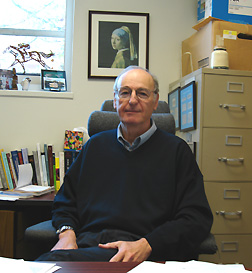FROM THE ASSEMBLY OF SCIENTISTS: VIEWPOINT
Ed. note: The following commentaries on current regulations regarding official travel by NIH employees represent the views of the authors and appear here under the auspices of the NIH Assembly of Scientists, which has been accorded a standing ViewPoint space in The NIH Catalyst. Individuals who wish to write a column should contact a member of the ViewPoint editorial board (Abner Notkins, Harvey Alter, Edward Korn, Alan Schechter, Joshua Zimmerberg).
 |
In this the winter, spring, summer, and fall of our discontent since implementation of the HHS interim final guidelines, there has been a retrenchment towards rationality, and some of the most egregious restrictions have been removed in the final guidelines. In particular, academic freedom has been restored in large measure and severe stock- divestiture rulings have been rescinded.
Nonetheless, the final HHS guidelines have provisions that continue to sap morale on campus and that serve as a deterrent to recruitment and retention. These include restrictions on paid consultation with industry and restrictions on travel, wherein DHHS appears to have more stringent guidelines than any other federal agency. This article will deal only with issues related to travel.
Word has trickled down that one of the foundations for these travel prohibitions is that "scientists travel too much." While it is true that scientists travel to meetings and to other academic institutions with some frequency, that is because it is in the very nature of science to stay abreast of the latest developments in one’s field, to disseminate one’s own findings, and to exchange ideas in person with collaborators and potential collaborators. In essence, meeting travel is intrinsic to good science.
Perhaps the most contentious issue is that NIH employees on approved official duty can take only two days annual leave in conjunction with any single meeting and are limited to six such days per year—unless they get an exception that can be granted only by the NIH director.
Further, if official travel is supported by an outside source, no personal leave can be taken unless an explicit exception is granted directly by the director of NIH.
Until recently, business-class travel was prohibited in most circumstances, even if paid by an outside source—suggesting that the ruling was not predicated on budgetary concerns, but rather over concern that an NIH employee might be unduly influenced by this perceived "perk."
In a recent HHS ruling, business-class travel now can be approved in a broader context, but only with written justification, several layers of review, and the personal signature of the NIH director. The ruling stipulates that the director cannot delegate this signatory authority.
In essence, by allowing one to travel on official duty, the government becomes able to prescribe not only what one does during the official activity, but also before and after that activity. It is akin to saying that because the government pays one’s salary, it can regulate what activities one performs beyond the paid work schedule, including weekends and holidays.
Whether HHS has the constitutional authority to exercise such overarching control of one’s personal time can be questioned, but my concern is not in the legalities but in the realities and in the now widely held perception that NIH scientists have lost some of the basic freedoms available to almost all other scientists in both the public and private sectors. This perception is damaging to NIH on many levels and, in the competition for high-level scientists, certainly places NIH at a disadvantage.
The HHS presumption that NIH scientists will take unfair advantage of the system to obtain paid vacation travel misses an important point. The critical decision should be whether or not the travel/meeting is a legitimate activity that fosters NIH science and brings value to job performance. This decision is part of the approval process for any NIH travel activity whether it is paid for by the government or by an outside sponsor. If the activity is deemed ethical and relevant to the HHS mission and approval is granted, then the government should have no further right to dictate the status of annual leave attached to that activity.
Most scientists give the government a huge number of unremunerated hours. This is not generosity on the part of scientists; it is what is necessary to get the job done. To have these "donated" hours rewarded by travel policies that control personal time is reprehensible; when the government is not paying for the travel, it is also incomprehensible.
The recent loosening of restrictions to allow the NIH director to make limited exceptions for personal leave or business-class travel does not address the fundamental issue and source of discontent. From a practical standpoint, the right to grant exceptions requires that scientists prepare written justification, that a new mini-bureaucracy be established to review these justifications, and that the NIH director personally sign each approval or denial. It seems inane to have the director of NIH spend even a moment of his or her time on such mundane matters when issues of great magnitude confront that office in unending succession.
Some may view business-class travel as a perk, but anyone who has traveled overnight in coach class to attend a meeting or give a talk on arrival knows the physical and mental exhaustion that greatly diminishes the activity that was the very purpose of the trip. Again, the focus should be on the nature of the activity and not on the mode of travel or the personal leave associated with the travel. Emphasis on the latter trivializes the purpose of the approved travel and disrespects the traveler’s intentions.
Abuse of travel is of course possible, but sweeping restrictions, such as those currently in place, punish everyone and still do not prevent occasional abuse. Instead, they create an atmosphere of distrust that impinges on morale and has more far-reaching consequences for NIH than does a rare case of system abuse.
Overzealous HHS reactions have sent messages throughout academia and industry that NIH, as great as it is, is no longer an environment conducive to unfettered science. The retention and recruitment of scientists is what is at stake in these deliberations over individual rights and, in their impingement, the scientific mission of HHS suffers.
It is hoped that "the road less traveled" could again mean what it has always meant to NIH—"to go where others have not gone"–rather than the current meaning—"not to go because you are not allowed."
—Harvey
J. Alter
Chief,
Infectious Diseases Section, Department
of Transfusion Medicine, CC
 |
TRAVEL:
TIME
TO CHANGE
THE REGULATIONS
We have all been frustrated by the regulations restricting annual leave during travel on official duty, especially for foreign trips. The rationale for such restrictions is that NIH scientists must not exploit, or even appear to exploit, their government position for personal vacation. Taxpayers’ money is not earmarked for government employees’ annual leave.
Recently, the rules have been somewhat relaxed, and it is now possible to take up to two days annual leave three times a year in the context of foreign official-duty travel (with extensions possible if an extension is granted by the NIH director).
Although a step in the right direction, the regulations are still too restrictive. Rules must make sense and must not create more problems than they solve. Even amended, the current travel regulations imply that we law-abiding scientists have illicit intentions and need punitive rules to preserve our innocence.
Earned annual leave should be independent of professional choices for attending scientific meetings or accepting lecture invitations. If a meeting is inappropriate to attend for whatever reason, it is inappropriate whether or not we take annual leave, at our expense, associated with the meeting.
Why would NIH control our annual leave to create standards for meetings we attend? Are they not independent variables?
The current travel regulations imply that we might attend poor scientific meetings at government expense to pay for our annual leave travel. In fact, as the rules currently read, they could discourage scientists from attending important scientific meetings that happen to be very far away and of short duration. In order to extend the professional travel, seminars are often arranged at institutions where we have colleagues in the area and these may be of dubious scientific necessity.
That we are routed through Washington on trips to several meetings that take place a week apart in adjacent countries overseas, or the suggestion that we go to a meeting, return home, and go back to the meeting place for annual leave is, of course, ridiculous.
My extramural colleagues at universities who also depend on NIH funding are flabbergasted at our travel regulations. They scratch their heads in bewilderment when I cancel or refuse invitations or when they watch me agonize over finding appropriate ways to reconcile a normal life with abnormal rules.
—Joram
Piatigorsky
Chief,
Laboratory of Molecular
and Developmental Biology, NEI